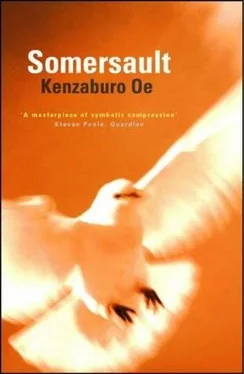"I told Ogi that if you don't carefully write all the details," Mrs. Tsugane replied, "it won't be much of a history of the age. We experience things with- out really knowing what they mean and how they'll end up, right? That being the case, all you can do is write down as much of what you saw and heard just as you experienced it. Maybe it's a case of God being in the details."
As if to forestall any quick reaction from Ikuo, Mrs. Tsugane translated her remarks for Fred, who blinked his chestnut-colored eyes as if, even in- side, it was too bright, and sighed. "It's amazing the amount of intellectual information that flits back and forth here."
As if this was the opportune moment he'd been waiting for, Gii said, in English, "I think Ikuo and Ogi have some things they need to talk over by themselves, things that don't need to be translated for Mr. Parks's article. I mentioned being an informant before, but I'd be happy to answer anything I can as honestly and accurately as I can. I won't just butter you up with things I think a foreigner might want to hear. So why don't we find a corner that's out of the sun, and you and I can talk?"
Fred Parks liked the idea. He and the Gii quickly moved over to the space between the piano and the wall where the triptych hung. Ikuo placed two chairs for them, his actions showing that he was quite used to being the one in charge now.
When it was just the four of them left, Mrs. Tsugane said, "Ogi resisted the idea of including in the record of the church such things as what he'd written down in his notebooks about the two of us doing that. Though he wrote it down at the time as if it were an important matter. I insisted that he put it into his first draft. It's a history of the church, but you also have aspira- tions to write a History of the Age, right? Unless you decide to write down all the details, including the ones that are hard to reveal to others, the ama- teur writer tends to leave out what's important. It's also good practice for describing the facts."
Ogi, of course, but also Ikuo, who'd read the typed first draft, were both unsure how to respond. At this point Dancer spoke up, her way of speaking unusually gentle now, something Ogi had picked up on the night before.
"I think I understand what Mrs. Tsugane is getting at," Dancer said.
"The same applies to the summer conference and my life up till then, even before I started living in Tokyo. When I try to remember things that hap- pened when I was a young girl in ballet tights, I can't distinguish between what was important and what's just extraneous details. During this past year since you left the office, Ogi, almost every day I've been mentally reviewing everything that happened, and it feels, like you say, that the key to everything lies in the details… "Ikuo, don't you need to tell Ogi how Professor Kizu passed away?
Just as Mrs. Tsugane said, try to conjure up the details of what happened.
Professor Kizu's parting words might seem like he was making fun of you, but aren't they important too? If you include them, and Ogi writes down all the details as he does in his notebook, who knows but that you might find yourself reaching a deeper understanding of what it all meant. I've only read a portion of the first draft, but it's clear Ogi is no longer just an inno- cent youth.
"On the other hand, I don't think there's anything I can say that would be of help. I won't be upset, though, if-to borrow Mrs. Tsugane's term- Ikuo tells everything about that which took place at the time of Professor Kizu's death. This might be hard to talk about in front of us women, so why don't I take Mrs. Tsugane over to see what the children of the Quiet Women have been doing? I think it'd be worth your while to see our fish pond, too, though with all this snow it might be like looking down a well."
In Dancer's now-mature voice and mannerisms there was something that made Ogi feel-in a complex way he'd never felt before-that she was truly an extraordinary woman. With Patron now gone, she'd been handling all the church members and the facilities for the last year and had, despite the events of the past, rebuilt relations with the town and local schools. As Dr. Koga had remarked the night before, there was a relaxed dignity about her now.
When the two women left the chapel, Gii raised his head like a weasel and looked over. But since the American journalist, puffing away despite the ban on smoking, was scribbling in the small notebook spread on his lap, Gii went eagerly back to talking with him in a low voice.
For nearly five weeks after the summer conference, both the Hollow and the Farm had been in turmoil. Below the surface confusion, though, some- thing deeper and more persistent was taking place.
The media's concern had been with the so-called FIERY SUICIDE AND LOYAL DEATHS of Patron and the Tachibana siblings; starting with intense TV coverage, specials appeared in the weekly magazines covering an overabun- dance of material in a typically unfocused way. The illustrated weeklies ran color photographs of the sprawled, naked body of Patron, like some dry- lacquered image of Buddha, with the nude, charred bodies of Ms. Tachibana and Morio reaching out to him.
When the church made its official response, which included dealing with the police, Ogi had been in the thick of things. So there was no need for him to hear once again from Ikuo about all this. Still, Dancer had prepared a file of clippings from the local press on this period for him to peruse.
As he was talking with Ikuo and leafing through these clippings, though, Ogi noticed that in the middle of September, just after he moved away from the Hollow, Kizu had finally opened his art school for junior high students.
As one of those involved, Ogi knew that the church had tried to repair its relationship with the Old Town and Maki Town. Guessing from his experi- ence at the time that Kizu himself wasn't pushing the project too hard, Ogi deduced that this must have been the doing of Asa-san, the wife of the former junior high principal. And this art school in the Hollow in turn had led to the present healthy relationship with the junior high and to their using the chapel for their music classes.
Another article discussed how Kizu's falling ill again had led to the clos- ing of the art school after a short time. Along with the article was a color photograph, about half the size of a postcard, of a landscape Kizu had painted of the fall foliage around the chapel and the monastery. Ikuo explained to the tearful Ogi that since the leaves didn't turn that well last fall, the painting must have been done in the beginning of December when Kizu took his students to the north shore for outdoor sketching instruction.
Soon after closing the art school, Kizu went into Dr. Koga's clinic. Ikuo speculated that the local reporter didn't touch on the events of the summer conference, or on the "miraculous" disappearance of cancer from his body, not just out of respect for Kizu's international standing as an art educator but because of his contributions to the town.
The previous night Dr. Koga had described in detail how Kizu had died of a cancer that, for his age, had spread quite quickly. The cancer, which Dr. Koga deemed a new occurrence of the disease, started in the liver and spread to his lungs, and the autopsy revealed some brain tumors as well. In the year that had passed, Dr. Koga had taken on the look of quite the coun- try doctor, his skin, including the bald spot now at the crown of his head, a sunburnt brown, his mannerisms deliberately exaggerating this role, refer- ring to himself, in imitation of Gii's childish way, with the rough pronoun washi instead of the normal watashi; Dancer gently ribbed him about it, and though his observations on the symptoms were quite pointed, his look was the same as always, a mix of gloom and urbane cheerfulness as he recalled what had happened.
Читать дальше





